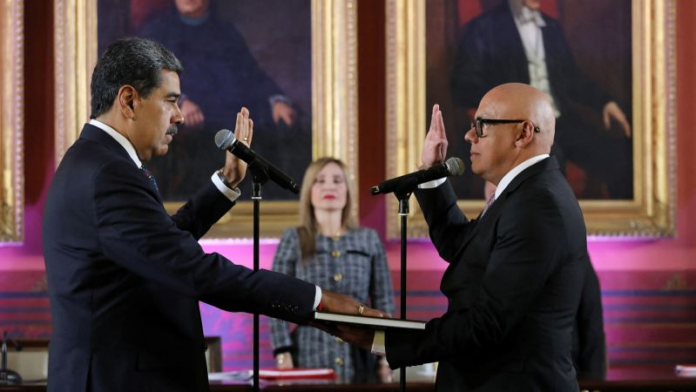CNN —
Venezuela’s Nicolas Maduro has been sworn in for a third presidential term in what the country’s opposition movement has decried as “coup d’etat,” culminating more than five months of dispute over last summer’s contested election.
The ceremony took place on Friday in a small room of the National Assembly, a marked difference from previous ceremonies held in the building’s main hall.
Maduro was sworn in by National Assembly leader Jorge Rodríguez, who placed the presidential sash on him, prompting thunderous applause from those in attendance.
“We’ve achieved what we knew we would achieve,” Maduro said during his first speech after being sworn in.
“The power given to me was not given by a foreign government, a foreign president or a gringo government,” Maduro said at the event, which saw Nicaraguan President Daniel Ortega and Cuba’s Miguel Diaz-Canel in attendance. “No one in this world can impose a president in Venezuela.”
China and Russia also sent representatives, with Russia’s State Duma Chairman Vyacheslav Volodin seen arriving late on a state media broadcast after the ceremony began ahead of schedule.
Maduro was proclaimed winner of the country’s presidential election on July 28, by electoral authorities under the tight control of the ruling Socialist Party.
But Venezuela’s opposition has published thousands of voting tallies claiming that their candidate, Edmundo Gonzalez, had actually won the vote with 67% against Maduro’s 30%.
People watch a screen as Venezuela’s President Nicolas Maduro is sworn in for a third six-year term, in Caracas, Venezuela, on January 10. Gaby Oraa/Reuters
Independent observers such as the Carter Center and the Colombian Electoral Mission, as well as CNN’s own analysis, have found the opposition tallies to be legitimate. And several nations, including the United States, have since recognized Gonzalez as Venezuela’s rightful president-elect.
And in a speech Friday afternoon, opposition leader Maria Corina Machado remained defiant, accusing Maduro’s government of trampling on Venezuela’s constitution. Going forward, “the pressure will increase even more until Maduro understands that this is over,” she pledged.
Maduro “violates the constitution, also flanked by the dictators of Cuba and Nicaragua, this says it all,” she added.
White House National Security Council spokesman John Kirby accused Maduro of “a complete disregard for democratic norms,” describing Friday’s swearing-in as “an illegitimate inauguration” in remarks to reporters.
González, who has been in exile since September with a bounty on his head by Venezuelan authorities, had pledged to return to Caracas this week in a potential last challenge to Maduro’s inauguration. But his planned return on Friday was called off due to security concerns, Paraguayan President Santiago Peña told CNN’s Isa Soares.
“I continue to work on the conditions for my entry into Venezuela and assume, as mandated by the Constitution and ordered by the people, the presidency of the republic and as commander in chief of the national armed forces,” González said in a statement Friday.
González’s last known location on Friday was the Dominican Republic, where he had recently met with regional leaders.
Criticism and new sanctions
Shortly after the inauguration, the US announced an 18-month extension of Temporary Protected Status for eligible Venezuelan nationals, and new rewards for information leading to the arrest of Maduro and his closest officials, including Interior Minister Diosdado Cabello.
The rewards for Maduro and for Cabello — now amounting to $25 million each — are the maximum rewards allowed under the State Department’s narcotics reward program, an official said.
The US also announced new visa restrictions for Maduro-aligned officials whom the administration says are responsible for undermining Venezuela’s electoral process, and individual sanctions on eight Maduro-aligned officials overseeing economic and security agencies in Venezuela, including a state-owned oil company and Maduro’s transportation minister.
On a call previewing the announcement, the official told reporters that Maduro “stands mostly alone at this juncture, with few friends in the region and the world,” noting statements from countries throughout the region and across the globe “since July 28th to call on Maduro to respect democratic norms.”
Meanwhile, the United Kingdom on Friday sanctioned 15 people associated with Maduro and what it called his “contested regime,” including leaders from Venezuela’s Armed Forces and members of the Supreme Justice Tribunal.
The European Union also issued sanctions against 15 people affiliated with Maduro, who have been accused of “undermining democracy, rule of law or human rights in Venezuela.” And Canada sanctioned 14 current and former senior officials who it said engaged in activities that “supported human rights violations” in the country.
The G7 also criticized the inauguration, saying it lacked democratic legitimacy. “We reject Maduro’s continued and repressive grasp at power at the expense of the Venezuelan people,” a statement from the group read.
‘A new phase begins today’
Maduro did not name any of Venezuela’s opposition leaders in his speech, but referred to the movement currently led by Machado and Gonzalez as “Guaidó 2.0” — a reference to Juan Guaidó, who in 2019 proclaimed himself interim president of Venezuela and was recognized by 50 countries, including the US.
“A Guaidó 2.0 talks to the people in the streets, a new Guaidó, and comes with the same baggage, we saw it, we saw their plans, we saw them yesterday,” Maduro said, apparently referring to an opposition rally attended by Machado on Thursday.
Guaidó also condemned the inauguration, writing on X that “the president of Venezuela is Edmundo González Urrutia.”
“Maduro only confirms his usurpation and the coup d’état they carried out on July 28,” Guaidó added. Venezuelan opposition coalition Plataforma de la Unidad Democrática echoed Guaidó’s remarks, saying, “a new phase begins today in this fight for the freedom of Venezuela throughout the national territory and in all sectors that form our nation.”
And Human Rights Watch Americas director Juanita Goebertus criticized Maduro’s swearing-in as “the culmination of an election that blatantly disregarded the people’s will and consolidates a dictatorship only sustained by brutal repression.”
Opposition leader Maria Corina Machado greets supporters during a protest against Venezuelan President Nicolas Maduro the day before his inauguration for a third term in Caracas, Venezuela, on January 9. Matias Delacroix/AP
Ahead of the inauguration, Venezuela closed its land border and suspended flights to Colombia – a move that Freddie Bernal, the governor of the Venezuelan border state of Tachira, claimed was in reaction to a “international conspiracy” against Venezuela, in an Instagram post. He did not provide proof for his claim.
The border closure came just hours after Colombia broke its silence on the issue and announced it would not recognize the results of last summer’s elections, stating they were not free.
Protests erupted in Caracas and other Venezuelan cities ahead of the inauguration, with Machado emerging from hiding to speak at one event on Thursday.
Machado was later “violently intercepted” at the event, according to her team, which said that “during the period of her kidnapping she was forced to record several videos and was later released.” The Venezuelan government has denied detaining Machado.
Machado said that despite attempts to quell dissent, Venezuelans had “defeated fear” with Thursday’s rallies.
“Yesterday, hundreds of thousands of Venezuelans went to the streets with civility, courage and profound love,” Machado said in her video message Friday.
This is a developing story and will be updated.
Venezuela’s Nicolas Maduro sworn in for third presidential term amid criticism
RELATED ARTICLES



